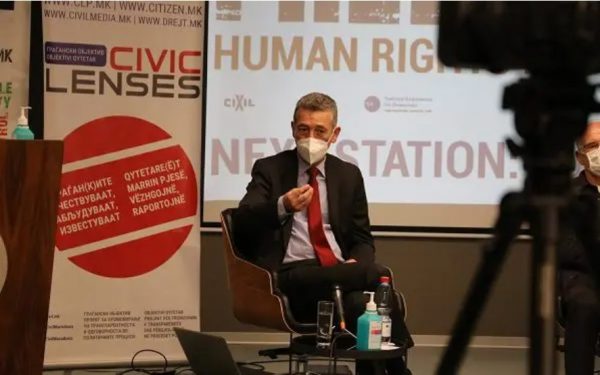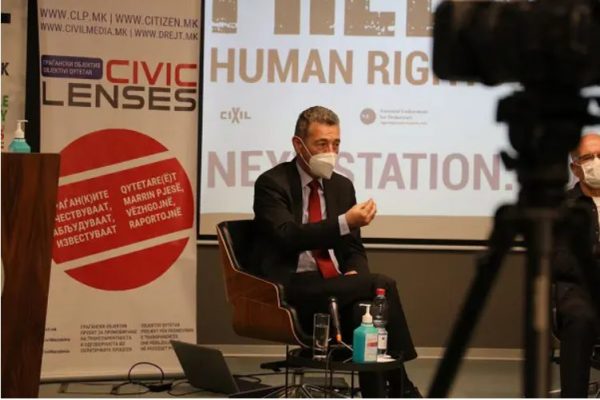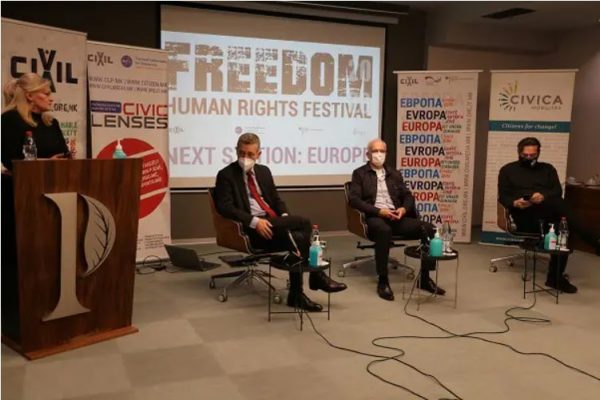On the topic census, Director of the State Statistical Office Apostol Simovski at CIVIL’s panel “Census: between statistics and politics”, extensively and in detail explains all the details regarding the process of the census of the population. At the panel discussion, Simovski announced and in detail described some newness, announcing that the census will not be allowed to be politicized, and explained the entire process and many more details that he considers the public has to know.
– The public should know all the details about the census, we should all be prepared, because even though it’s only a statistical operation, this activity is not just a statistical one, but an activity that should provide data for the general good. Data with which development policies in the country in the next ten years will be created, and based on which every citizen in our country will benefit from this work.
The preparations for this census have started long ago, a census is not prepared in a month or two, or a year, it’s prepared for a longer period of time, that is, as a rule, preparations begin when the previous census ends, meaning the preparations for the next census start immediately the following day. Certainly, based on knowledge, experiences, but also experience on the needs of the public for information, we have been preparing for quite some time. However, what is a setback at the moment is the adoption of the law, the debate in the Parliament started yesterday, says Simovski.
Regarding the technical aspect of the implementation of the census, Simovski announced that the census will be conducted in a combined method.
-We are finalizing the part on the technical aspect. This census will be a bit more specific than the previous one, since we will not go with the traditional way of how censuses have been conducted in our country, but rather will use a so-called combined method. This method is nothing new, it’s a worldwide practice. This method implies also on the ground survey and collecting data that are found in certain state databases, because it is recorded data that has been collected on legal basis and is accurate. I will try to explain as simply as possible for the public to understand what it means.
We are preparing a pre-census base that is a configuration of 6 different databases. The main base is the population register, and data is pasted on it, and the key for pasting that data is the unique identification number of citizens, hence there cannot be any slips, or wrong data. From databases of the Employment Agency, the Pension and Disability Insurance Fund, Ministry of Education, Ministry of Labour and Social Policy, the Public Revenue Office and so on. Here we already have a certain fund of data for every person who figures in that population register. In principle, it is a bit broader than the register of citizens. And we already have that information that is verified, accurate and documented.
Concerning data that is variable, we will ask on the ground, and data that refers to the sentiment of people, which cannot be documented, we will have to collect on the ground. This is that combination we are talking about. Another big difference from previous censuses is that now we will not have paper questionnaires, but electronic ones, namely, a questionnaire that will be incorporated in a notebook computer, that is, laptop computer that will have communication with the databases I mentioned. By entering the unique identification number of citizens, data is automatically downloaded for that person that is in our base, previously prepared, and accordingly the ones we collect on the ground are updated, and certainly the persons themselves can personally check the data from the database. This means that the data will be visible, it will not be hidden. Let me explain, if you are employed somewhere, in a certain business entity, we have information from three databases that you are employed, where you are employed, what your occupation is, and the activity of the business entity, and there is no need to ask on the ground about this since we have it documented.
You pay taxes, social security and everything is in the bureaucratic documentations from where it should be provided, and we do not bother the population with all this unnecessary data. After all, even if we do ask on the ground, as we have until now, there is a very big chance, without any intention for the person to make a mistake, to give wrong data, or incomplete or poor quality data.
Since I mentioned employment, let’s all of us ask ourselves, if we are employed, what occupation do we have, for us a very important feature in the census, and which we will all get wrong when we will tell the exact occupation. Some will say – journalist, but a journalist can be in one editorial office, or in another, a third one… We need specifics, and there we have the most specific, it begins with the systemization of jobs. And some even coded classification. Which means that one of the phases that we need to do afterwards, has already been completed and verified. This gives greater quality and shortens the necessary time for conducting this operation, which is very important for us, and gives results. The quickest processing of results from a census lasted a year and a half, which is so far a record time for data processing, previously it lasted from two to two and half years. As it is currently in the law, we need to come out with processed data six months after conducting the census. I have publically said several times that we will probably finish in three months. As many of the things are already incorporated in that application. That application solution has the entire set of controls that, in principle, we used to do afterwards. Even if the person collecting the data makes an error, the computer will notify about the error, and that error will be corrected together with the person providing the data. If it’s performed during the processing, then it already comes to mathematical models, and we go we that probability of the answer.
The public reacted fiercely to the announcement two years ago that the upcoming census would not contain the graph on ethnic origin. Simovski says that there had been a proposal, but that this will not happen.
- I was the promoter of the idea in this census to exclude the question ethnic origin, not because this question does not give nice, interesting and useful information, but because that question is the main moment where politics take a hold of the census and want to abuse it to the maximum. And I will not agree that politicization began with the census in 2012, it was practiced in the previous system as well, afterwards, says Simovski. I am a demographer by profession and I am interested in demographic movements among various ethnic and religious communities, as these differences in this part differently impact the demographic events. Those customs, beliefs, etc. They have their own impact in reality, and that is why we want to analyse them. But if we put on a scale how much we gain with these questions and how much we lose when politics takes a grasp on them, I promoted it as my personal position, and then the Statistical Office accepted it as its position. However, the public reacted as it did, and so we accepted for this question to be included because the public has an interest. It will be included in the census and everyone will be able to freely express themselves how they want to.
- – Often, politicians wanting to say that the census, even if we wanted, has to be a political topic, because in the Constitution we have certain rights that are acquired based on the percentage of representation. Either we don’t know how to read the Constitution, or we don’t want to read it. In the Constitution it is written – citizens speaking a language other than the Macedonia should refer to the 20 percent, the ethnic origin is not mentioned anywhere. Even in the recommendations of the United Nations, things are mixed up here too in the public, Eurostat doesn’t have its own recommendations. There are recommendations of the United Nations, the European Commission, for Europe, it is a part that we belong to as a country, it brings recommendations that Eurostat also accepts. Meaning everyone, also Eurostat, participate in those adoptions and like every other country, we too as a country, as a statistical office, participate in the preparation and adoption of those recommendations. And ultimately, once they are adopted, they apply to all countries in the world, equally. The rules of the European Union are very simple, the censuses should be conducted in the years ending with number 1, and there are two more regulations, one of them explaining the output, what should be the output of the census, in what form, what kind of tables, content, and second, what methods of conducting the census are available.
- There are four methods in the world, which are implemented with a combination of techniques, and there are no other methods in the world. There is a traditional method, classical census and this combined one that we are using. There is a method of using data only from registers, that is perfection and hope to God we achieve it… This year, 11 countries in the European Union will carry out their census this way, and there is one unique method that France applies, so-called “rolling census”, where over the course of ten years, surveys are conducted and together they are sublimated as census data. But this is a unique French experience, not a single other country in the world applies it because they think they cannot. And that’s that, there are no European standards, there are world standards that Europe accepts. And the opposition says that the census does not meet the European standards… What standards? The census was supposed to be last year, outside the EU regulations, but we received permission from Eurostat because we didn’t have one in 2011, and were supposed to conduct a census in 2012, not in 2020…
We say 2 million and 73 thousand inhabitants lived in our country in December last year, is there a person in the country who will believe this data? It is official because it is produced from the last census and administrative data, and from that mathematical aspect, this data is correct. But unfortunately, as Mr. Deralla mentioned, not now, but for centuries, we have been a migrating region. The entire Balkans are such an area. At these times, all countries are emigration or migration areas, but unfortunately we are even more so due to the economic circumstances that are not at the level of those in Europe, America, Canada… The world labour market dictates what that fluctuation will be like. Unfortunately, we are now in a situation, not because of the political situation, but because of the simplest economic aspects, for people to be fleeing.
We have one more newness, unlike in 2011, we will also be enumerating people who have been outside the country for more than a year. Although, in accordance to the world standards they are not included in the total residential population. But we will count them because we want to have information how many people we have outside the country, information that we don’t have. Furthermore, our list of residents will also include foreigners who have been residing in our country for more than a year, as a reciprocity for those who are absent. This will be performed so that they are not counted twice, if they are from another country, they will not be enumerated there, but here. For our mayors to be able to plan how many people have the need of institutional support and that is the reason why it’s defined this way. I even think that it’s good that the census was not conducted in 2012, so that we can realize how much we need it, mostly the business sector. Worldwide, the business sector is the greatest user of census data, and in our country it is the smallest. But now they have realized, when they need to fight for every employee, when they cannot find on the labour market qualified, proper workforce. The local governments have also realized this, because they need to know at all times not only how many people live there, but also gravitate there…
We have formed the set of questionnaires in the census based on experiences, from using data and requests for data from users. And I urge everyone to stop using the census for political purposes. As Deralla said, we should be concerned with how many we are, and not what we are, later we can be concerned with this. We need to see how many we are, and where our people have gone, and from where… What we have lost, and are there any chances we can make any policies to return these people, or stop others who have decided to leave, says Simovski.
The fact is that the census is being politicized, but the problem is how much we as institutions will allow for it to be politicized. And I will say it publically again, not a single political entity is to be blamed for the politicizing of the census in 2012 and it failed. Yes, they seized the moment, but we, the institutions are the ones that are opening them the doors to politics. We proposed a law in which we said that not the State Statistical Office, but the State Census Commission will conduct the census, which is proposed and changed by the government, hence that is the most worrisome thing, and that is why we are obligated, we feel obligated not only for the census, but also to close that door and to prove and show that this institution is a real institution and that in this country the institutions are not as they are perceived, that they are non-functional and no good. On the contrary, we are not as the public sees us, but are the main guilty party for that image.
The census will cost eight million euros, unlike the previous one that cost 14 million euros. For this census we are procuring, and have already received, five thousand six hundred and fifty laptops, top models, with best configuration. This census will not have paper questionnaires, but electronic that costs money, is expensive and is very complex, and yet the census will still cheaper by 5 and a half million. And once we finish with the census, we will give these computers to the state to distribute to the education institutions, in places where they are needed, which means that they will have a prolonged use value.
Diana Tahiri
camera: Atatnas Petrovski
editing: Arian Mehmeti
photography: Biljana Jordanovska
translation: N. Cvetkovska

















